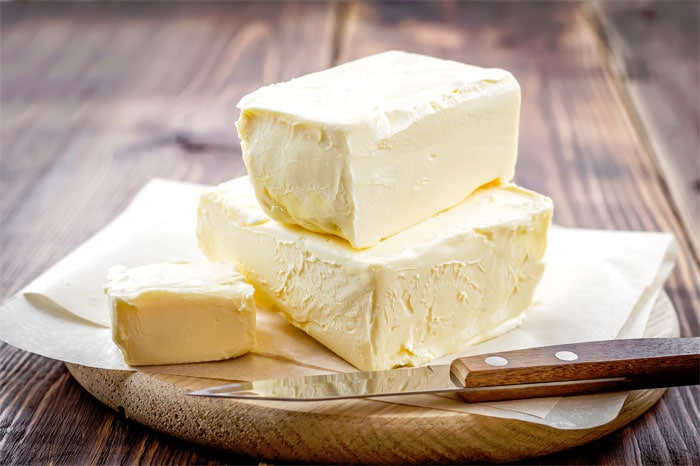
Written By: Gloria Tsang, RD
Title: Founding Registered Dietitian
Alumni: University of British Columbia
Last Updated on:

The debate on whether butter or margarine is better for our health is still as hot today as when it first arose. To determine which one is better for heart health, let’s look at the fat content of both butter and margarine.
Table of Contents
Butter, as an animal fat, contains both saturated fats and cholesterol – the two dietary ingredients that increase blood cholesterol. Saturated fats can raise LDL cholesterol (also known as “bad” cholesterol), which raises total blood cholesterol as well. Cholesterol in foods, on the other hand, has little effect on blood cholesterol in most people. But for a small portion of population, even a little dietary cholesterol can cause a soar in blood cholesterol levels.

When margarine was first introduced to the marketplace, it was loaded with trans fats. The trans fats were created through hydrogenation – the very process used to solidify liquid vegetable oil into a spread. Just like saturated fats, trans fats increase LDL cholesterol (“bad” cholesterol) and lower HDL cholesterol (“good” cholesterol).
By now, both United States and Canada have banned the use of artificial trans fat in our food system. Therefore, margarine nowadays are non-hydrogenated margarine. Non-hydrogenated margarine contains no trans fat, and it’s softer than the first-generation margarine stick.
Instead of hydrogenating liquid vegetable oil, manufacturers now add modified palm and palm kernel oil to enhance the spreadability of margarine, creating a softer texture. In addition, some products may have been added with diary or cream to create a creamy texture.
| (per 1 Tbsp) | Butter | Soft-Tub Margarine | Stick Margarine |
| Calories | 102 kcal | 60 kcal | 101 kcal |
| Total Fats | 11 g | 6 g | 11 g |
| Saturated Fats | 7 g | 1 g | 2 g |
| Trans Fats | 0.3 g | 0 – 0.5 g | 3 g |
| Cholesterol | 33 mg | 0 mg | 0 mg |
Note: Butter contains natural trans fat, as with all dairy products.
BOTH saturated fats and trans fats can raise total cholesterol and LDL cholesterol. Therefore, try to minimize the intake of both saturated fats and trans fats.
When we add up the numbers, it’s clear that butter contains the most saturated fats. If used as a toast spread everyday, butter may not be an ideal option. For daily use, choose soft margarine instead.
Indeed, the American Heart Association recommends the use of margarine as a substitute for butter.
Alumni: University of British Columbia – Gloria Tsang is the author of 6 books and the founder of HealthCastle.com, the largest online nutrition network run by registered dietitians. Her work has appeared in major national publications, and she is a regularly featured nutrition expert for media outlets across the country. The Huffington Post named her one of its Top 20 Nutrition Experts on Twitter. Gloria’s articles have appeared on various media such as Reuters, NBC & ABC affiliates, The Chicago Sun-Times, Reader’s Digest Canada, iVillage and USA Today.
butter, cholesterol, margarine, non-hydrogenated margarine, saturated fats, trans fat
There is a product, Mazola Soft Margarine, which states that it uses “non hydrogenated palm oil”. I know that non hydrogenated oils are better, but I don’t know if I can trust the aforementioned product, because it is not on the list given here. The first ingredient in Mazola Soft Margarine is “pure corn oil”, by the way. Should I be able to use this product as a healthy choice, or not. I cannot find any of the other products in my country (Saudi Arabia).
Thank you,
Jacques James
Thoughts on this? https://www.ncbi.nlm.nih.gov/pmc/articles/PMC9794145/#:~:text=The%20PURE%20investigators%20found%20that,risk%20of%20stroke%20%5B34%5D.